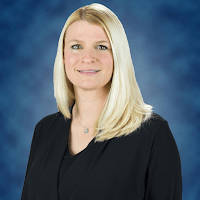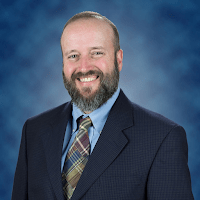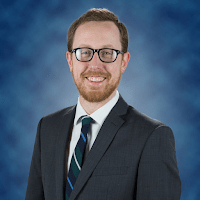Peirce College welcomes three new full-time faculty members
Peirce College welcomes three new full-time faculty members
Peirce College is yet again growing in its family through the addition of three new full-time faculty members: Professor Christopher Nosal, Assistant Professor, English and General Education, Professor Erin Rybicki, Associate Professor, Legal Studies, and Professor John-Patrick Schultz, Associate Professor, General Studies. We asked each of them a few questions, so we can all get to know our newest educators at Peirce College.
Welcome to Peirce! Tell us a little bit about yourself.
Professor Nosal: I have my BA in English and an MA in Creating Writing/English from Temple University. I began my career in higher education working with both Dr. Charlene Glenn and Dr. Rita Toliver-Roberts in the Walker Center back before it was even called the Walker Center. After working at Peirce, I worked at Saint Joseph’s University for 13 years running and teaching in the University’s Passport Program for conditionally admitted freshmen. Most recently, I was the Director of the Learning Assessment and Support Center at Valley Forge Military College, where I taught first year seminars, supervised tutoring and other academic support programs, provided testing and disabilities support, and even administered placement testing. I have taught courses as a part-time faculty member at Peirce College for 20 years and I am excited to now be a Peirce College full-time faculty member continuing to teach English, Communications and Humanities.
 Professor Rybicki: I am a lawyer licensed in New Jersey, and a life-long New Jersey resident. For more than a decade I have taught and managed Legal Studies programs, and I really enjoy focusing on teaching excellence and managing the American Bar Association approval standards. I am an active member of AAfPE (American Association for Legal Studies and Paralegal Studies) and I enjoy writing and researching on topics pertaining to Legal Studies. I especially enjoy teaching courses in Career Development and Legal Ethics. I have a Juris Doctor degree from Delaware Law School and a bachelor’s degree from Rowan University. In addition, I have my Master’s in Education Foundations from Widener University. I plan to continue my education towards my Doctorate in Education (Ed.D) with a focus on Teaching and Leadership in the fall. Now, you can find me teaching Legal Studies courses at Peirce College.
Professor Rybicki: I am a lawyer licensed in New Jersey, and a life-long New Jersey resident. For more than a decade I have taught and managed Legal Studies programs, and I really enjoy focusing on teaching excellence and managing the American Bar Association approval standards. I am an active member of AAfPE (American Association for Legal Studies and Paralegal Studies) and I enjoy writing and researching on topics pertaining to Legal Studies. I especially enjoy teaching courses in Career Development and Legal Ethics. I have a Juris Doctor degree from Delaware Law School and a bachelor’s degree from Rowan University. In addition, I have my Master’s in Education Foundations from Widener University. I plan to continue my education towards my Doctorate in Education (Ed.D) with a focus on Teaching and Leadership in the fall. Now, you can find me teaching Legal Studies courses at Peirce College.
Professor Schultz: Before graduate school, I went to La Salle University — I graduated in 2006 with a BA in philosophy and religion. Then, I served as a Lasallian Volunteer high school teacher in Yakima, Washington for a year, coming back to earn my Master’s and PhD in philosophy at Villanova University. Now, as a full-time faculty member at Peirce College, I teach (among other things) all the courses in philosophy: HUM 102, “Introduction to Philosophy,” HUM 275, “Ethics and Leadership,” HUM 300, “Great Thinkers,” and COM 312, “Critical Reasoning.”
What inspired you to become a professor?
 Professor Nosal: My professors during my undergraduate inspired me to teach. I respected their lives outside of work and their creative and intellectual pursuits too. They were just interesting people, and as a first generation college student from a working class family, they opened up a new way of thinking to me. I could be a blue collar scholar and a writer! During my first teaching experience at Peirce, I was lucky to work with some great, seasoned instructors and some young professionals who were full of enthusiasm and creativity. I continuously try to make the classroom fun because it makes me happy, but it also makes students feel comfortable and valued as people.
Professor Nosal: My professors during my undergraduate inspired me to teach. I respected their lives outside of work and their creative and intellectual pursuits too. They were just interesting people, and as a first generation college student from a working class family, they opened up a new way of thinking to me. I could be a blue collar scholar and a writer! During my first teaching experience at Peirce, I was lucky to work with some great, seasoned instructors and some young professionals who were full of enthusiasm and creativity. I continuously try to make the classroom fun because it makes me happy, but it also makes students feel comfortable and valued as people.
Professor Rybicki: In the sixth grade, I was asked to write what I wanted to be when I grow up. I am not quite sure that I knew what it meant to be a professor at the time, but I wrote that I wanted to be a lawyer and a teacher. Oddly enough, that is exactly what I am today. I absolutely love being a professor, and I consider myself so very lucky to be able to do my dream job.
Professor Schultz: Before I went to college, I had this idea that education was more or less boring. It always seemed like the goal was to cram our heads with facts and figures so that we can perform well on tests. But then in college, it became really clear to me that education can be something completely different. I remember so clearly now that after a few of my classes I walked away thinking, “Wait, I never thought about that. Now I’m not sure what I believe!” I started to see that teaching, specifically teaching philosophy, can be a way to not just go through the motions of our lives like well-oiled machines; it can actually be like a wrench thrown into the machines that stops them for a minute, so we can start asking why we’re doing what we’re doing, why the world is the way it is. Once I figured this out I knew I needed to be a philosophy professor.
What advice would you give to potential students who are thinking of coming back to school, but may be intimidated by the idea of doing homework, schoolwork, tests, etc. again?
Professor Nosal: Having seen my wife return to school and do an MA when she was close to 40 years old, I would say that it is important to communicate with your family and get the support of everyone who cares about you. They will help you make time to get your work done if they know this goal is important to you. Also, find a workspace and a time of day where you know you can be productive. Communicate to your family and peers that you will need this space and time to be successful. Don’t forget to keep in mind that the piece of paper, the diploma, comes at the end of a long journey, so you have to get in the mindset to enjoy process, even English 103 or Statistics!
Professor Rybicki: I always encourage my students and potential students to work with their academic advisors to formulate a plan that works best for their lives. Each student is different. Many students have family and work obligations, so working with their advisor will allow them to select the right course load for them. I, also, encourage potential students to explore the many resources offered by the Walker Center at Peirce College. The Walker Center offers training and tutoring that allow students to excel in their courses through targeted academic support. By carefully planning a course of study, students will find that completing their degree is much more manageable and can be a very enjoyable and rewarding experience. 
Professor Schultz: A big task like going back to college is really scary. But I think a lot of people sell themselves short. They can sometimes forget how smart and powerful they are. So I hope folks can start to see the ability and potential they have. And that’s something that we want to help with. I hope people know just how much the faculty and staff want to help students bring out all their inner brilliance. It’s not as scary when you remember all the support system you have here and when you remember just how powerful you can be.
Thank you, professors! Keep an eye out for Professor Nosal, Professor Rybicki and Professor Schultz in the classroom and around campus.
- Prev Post
- Next Post
© 2024 Peirce College. All rights reserved.

LeaveComment